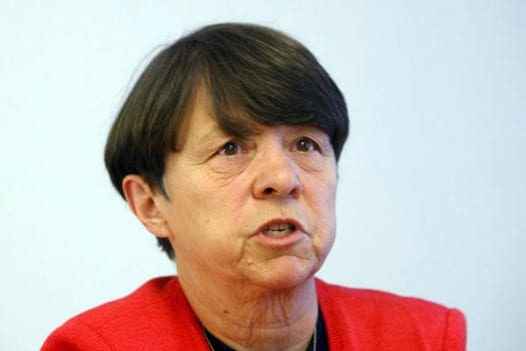Is the New Head of the SEC Dr. Jekyll or Ms. Hyde?
President Obama’s nominee to head the Securities and Exchange Commission (SEC), the government agency charged with regulating the nation’s stock exchanges and securities markets, is Mary Jo White.
How White handles her new post will reverberate all the way down to Main Street. The SEC exists to prevent corporate abuses like accounting fraud, insider trading and other violations of the nation’s securities laws while requiring that publicly traded companies disclose all meaningful and accurate information so that people can make “sound investment decisions” when they buy or sell securities.
While White has many supporters because of her experience dealing with Wall Street, the idea of her leading the policing of the nation’s financial district in the wake of its misdeeds is less than, well, black and white. In fact, there are many shades of grey regarding her appointment.
On one hand, White has great experience from a former job as U.S. attorney. On the other, for the the past decade she has been a white-collar defense lawyer — a partner for Wall Street firm Debevoise & Plimpton.
Whose Side is Mary Jo White On?
Supporters of White laud her appointment. She is a former district attorney with a long history of going after fraudsters, gangsters and terrorists during her career as a prosecutor. In fact, she has an impressive list of accomplishments:
- As chief assistant U.S. attorney for the Eastern District of New York, she led the successful 1992 prosecution of Mafia boss John Gotti.
- As U.S. attorney for the Southern District of New York, she oversaw the prosecution of the instigators of the 1993 World Trade Center bombing and helped convict four followers of Osama bin Laden for their roles in the bombing of American embassies in Africa in 1998.
- In the financial realm, she indicted the Japanese firm Daiwa Bank in 1995, accusing it of illegally covering up $1.1 billion in trading losses, and helped convict Patrick R. Bennett, a Wall Street schemer who cheated his investors out of nearly $700 million.
New York Attorney General Eric Schneiderman praised White’s nomination: “She is a tough, experienced prosecutor, which is exactly what the SEC needs right now to restore investor confidence.”
But White does have detractors. They note that she spent the past 10 years as a defense attorney for some of the very same Wall Street firms she now must regulate:
- In 2005, she aroused controversy — and a U.S. Senate investigation — over allegations she improperly sought information from the SEC about the hiring of John J. Mack as the chief executive of investment bank Morgan Stanley.
- In 2010, she represented former Bank of America CEO Kenneth Lewis after he was sued by the state of New York for defrauding investors in the bank’s acquisition of Merrill Lynch.
- She represented JP Morgan Chase between 2010 and 2012 in cases stemming from the financial crisis that precipitated the Great Recession.
- All in all, she earned millions at Debevoise & Plimpton as a partner in a firm that represented a virtual Who’s Who of Wall Street — BoA, Morgan Stanley, Goldman Sachs, Deutsche Bank and AIG — and a number of other companies that many believe helped cause the financial meltdown that almost crashed the world’s economy.
In response to JP Morgan Chase CEO Jamie Dimon’s statement that White is “a perfect choice” for her new job, one critic opined, “Obama is not going to clean up financial corruption by pinning a sheriff’s badge on Wall Street’s protector-in-chief.”
The Revolving Door Continues to Spin
While it remains to be seen whether White can go back to being the tough prosecutor who went after white-collar criminals after spending years defending them, perhaps the most disturbing aspect of her appointment is the continuation of the revolving door between the upper echelons of Wall Street and powerful positions in the federal government.
Over the past few decades, many officials in the Treasury Department and various federal regulatory agencies have either come from Wall Street banks or other large financial institutions; gone to Wall Street banks after their government service; or both:
- Robert Rubin, who served as secretary of the Treasury under President Clinton, was at Goldman Sachs for 26 years before serving in the Cabinet. After leaving office, Rubin was on the board of directors at Citigroup from 1999 to 2009.
- Before serving as secretary of the Treasury under George W. Bush, Henry Paulson spent 22 years at Goldman Sachs, eventually assuming the position of CEO.
- Peter Orszag, who served as director of the Office of Management and Budget between 2008 and 2010, left the Obama administration for an executive position at Citigroup. He is vice chairman for global banking and a member of the company’s Senior Strategic Advisory Group.
- Timothy Geithner, Obama’s first Treasury secretary, was president of the Federal Reserve Bank of New York.
- Jack Lew, whom President Obama recently named as his new chief of staff, worked at Citigroup between 2006 and 2009.
And so, the question remains: Will White be another fox guarding the henhouse or will she use her new power to help clean up Dodge City on the Hudson?
Stay tuned, America. Your stocks and mutual fund accounts could be on the line.


















